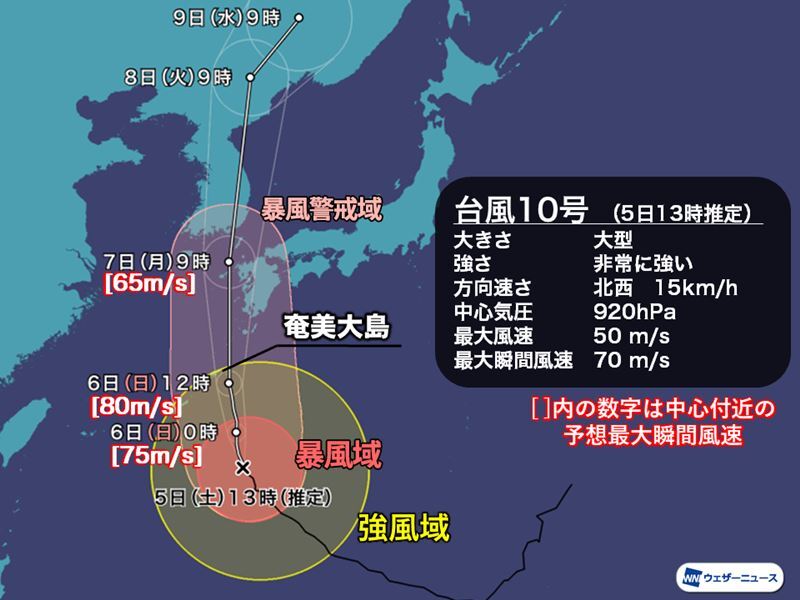
2020/09/05 13:51 Weather news
Estimated at 1:00 p.m. on Saturday, September 5, Major Typhoon No. 10 (Hai Shen) is moving northwest as it develops about 170 km south of South Daito Island.
The central pressure is 920 hPa and the maximum instantaneous wind speed near the center is 70 m / s, maintaining a very strong force. It is expected to develop further in the future, and by 3pm today, it is expected to become a “fierce” force and pass near the Great Eastern Islands. The Daito Islands have already entered the storm zone, but a power outage appears to have occurred, and as of 10:50 AM, the Amedas observation information, including wind speed and rainfall, has not been updated.
Wind speed is expected to increase as the typhoon approaches. When the typhoon gets closer, a storm blows with a wind speed of almost 70 m / s, and the weather turns stormy like never before, which can cause enormous damage.
▼ Typhoon No. 10 estimated at 1:00 p.m. on September 5 (Saturday)
Existence area About 170 km south of Daito Sur island
Large size class
Very strong force class
Movement 15 km / h northwest
Central pressure 920 hPa
Maximum wind speed 50 m / s (near center)
Maximum instantaneous wind speed 70 m / s
![box0]()
Typhoon No. 10 is expected to move further northwest, with the main island of Okinawa and the Amami Islands expected to enter the storm zone later tonight, with almost the entire Kyushu area entering the zone of storms on the morning of the 7th (Monday) the day after tomorrow.
The force at the time of approach is the strongest class of all time and meets the standard for issuing special warnings. If we approach with such power, there is a greater risk of serious damage without landing. Be prepared for a typhoon today, Saturday the 5th, in case of the worst.
 Prediction of the risk of power outage due to Typhoon No. 10
Prediction of the risk of power outage due to Typhoon No. 10
Typhoon No. 10 is expected to move further northwest, with the main island of Okinawa and the Amami Islands expected to enter the storm zone later tonight, with almost the entire Kyushu area entering the zone of storms on the morning of the 7th (Monday) the day after tomorrow.
The force at the time of approach is the strongest class of all time and meets the standard for issuing special warnings. If we approach with such power, there is a greater risk of serious damage without landing. Be prepared for a typhoon today, Saturday the 5th, in case of the worst.
According to the Weather News “Power Loss Risk Prediction”, there is a possibility of a power outage across Kyushu and Chushikoku, and the risk is particularly high in the coastal areas of Kyushu. Since there is a risk of a power outage for a long time, it is essential to take action in advance.
(It was calculated based on the result of the correlation analysis between the power outage report obtained from the user of the Weather News application during the past typhoon and the wind speed data from the weather observation device.)

 Storm surge mechanism
Storm surge mechanism
High tides are also dangerous because the central pressure when approaching is very low. If the siphon effect due to a decrease in atmospheric pressure and the explosion effect due to a storm overlap, it is not unusual for the tidal level to reach a record high.
This time, the wind around the typhoon is very strong and the direction of travel does not change after approaching, so there is a risk that the blowing effect will be significant. At present, the expected wind directions include Kinko Bay, Shibushi Bay, and Ariake Sea. However, even a slight change in wind direction will change the affected bays and shores, so be sure to check the latest forecast heading.

 72 hours of accumulated rain expected until the night of the 7 (Monday)
72 hours of accumulated rain expected until the night of the 7 (Monday)
As the typhoon moves north, there is a risk of heavy rain over a wide area from Kyushu to Kinki and Tokai.
Precipitation is expected to increase on the Amami and Goto islands, which are close to the typhoon’s course, and on the Pacific side of Kyushu, Shikoku and Tokai, where wet winds continually blow towards the typhoon.
There is a risk of heavy rains exceeding 300 mm in many places until the night of the 7th (Monday), and locally exceeding 500 mm. Watch out for sediment-related disasters, river flooding, and flooding.
Additionally, some dams in western Japan have previously been launched in preparation for heavy rains. Be aware that the water level can rise downstream of the dam before it starts to rain.


It can be difficult to get out when a typhoon is approaching. Measures such as purchasing necessary items and reinforcement outside the house should be taken, especially before the wind is strong, and when evacuating, it is necessary to judge as soon as possible.
In Okinawa and Amami, the weather is getting worse, so take action as soon as possible. Make sure you are ready today in Kyushu too.

Typhoon names are 140 names prepared in advance by members of the international organization “Typhoon Commission” and are named in the order in which they occur.
Typhoon No. 10’s name “Haishen” is a name proposed by China and literally means god of the sea.







